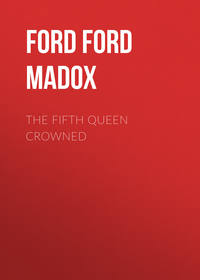 полная версия
полная версияThe Young Lovell
"There was no moon last night," the Lady Margaret said.
"Then, by the light of the star Arcturus," the lawyer claimed. "Well, my first motion was to rate her for a naughty witch. And so I did full roundly till that woman fell a-weeping and vowed to reform."
"Well, you were more powerful than the prophets with the Witch of Endor," the lady mocked him.
"And, seeing her in that good mind," Stone went on with his tale, "I remembered that she was a very old woman – the oldest of all these parts. So I told her that if she could remember matters of Barnside years agone, since she was in a holier mind, without doubt the young lording would be gracious to her and would grant her a halfpenny a day to live by; so she might live godly, after repenting in a sheet… So she remembered very clearly that one Hindhorn of Barnsides, Henrice Quinto Rege, had been used, once a year, at Shrovetide, to drag with three bullocks, an oaken log bound with yellow ribbons to the Castle. This was direct and blinding evidence that the right of fire-feu …"
"Well, you went with the old hag to the chapel," the Lady Margaret said. "I can follow the cant of your mind and spring before it."
"But you may miss many and valuable things," he retorted. "As thus… Whilst we went up the hill, this old goody, being repentant and weeping, cried out when she heard whither we were bound: 'Alas! Horror! Woe is me!" and other cries. And, when I pressed for a reason, she said that the young lording was a damned soul and that was one of her sins. For she had taught him magic and the meeting-places of warlocks; one of which was that chapel that was an ill-haunted spot, and that was why the lording was there at night. And she was afraid to go near the chapel; for the warlocks would tear her limb from limb. And the familiar and succubus of the Young Lovell was the toad that was, in afore time, the step-mother of the Laidly Worm of Spindleston, that to this day spits upon maidens, so much she hateth the estate of virginity, as often you will have heard."
The lawyer paused and looked long at that lady.
"So that old witch repented?" she said at last, but she gave no sign of her feelings.
"There was never a more beautiful repentance seen," the lawyer said. "So she sighed and groaned and the tears poured off her face to think that she had corrupted that poor lording…" And it had been her repentance, he went on, that had let them see what they had seen, and so made it possible for them to save him.
Now when they came to the chapel, said the lawyer, the young lording, as if he were demented, came rushing out from the door, and the Decies who had watched all night in the porch came out after him, and asked him what he would. But he answered nothing to the Decies and nothing to them, but, with a marvellous fury, like a man rushing in a dream, he ran into the shed where his horse was tethered, and bringing it out, so he galloped away that his long curls of gold flapped in the wind. It was not yet cockcrow, but pretty clear.
Thus those three, standing there and lamenting, saw how, at no great distance, but just under Budle Crags, there was a fire lit, and round it danced wonderful fair women and some old hags and witch-masters, but most fair women.
The lawyer, saying this, gazed hard at the Lady Margaret, but once again the lady said no more than —
"Aye, my cousin was always one for fair women."
"So he kissed and fondled them; it was so horrid a sight…" the lawyer went on.
"Now is it a horrid thing," the lady asked, "to see a fine lording kiss a fair woman?"
"I only know," the lawyer said, "that at once all we three fell to devising how you, ah, most gentle lady, might be saved from the embrace of this lost man; and how that poor lording might be saved from his evil ways, and have his lands and all his heritage preserved to him."
"And the upshot," the lady asked, with a dry pleasantness, "was what the Decies did in the Great Hall."
When the Young Lovell, sitting amongst the furze and broom, had heard so far, he sighed with a deep satisfaction. The old Elizabeth had told her tale of sorcery alleged against himself at an intolerable length, dwelling on the nature of linen clouts here and there, and upon all that she had said to the Lady Rohtraut when she lay in the swoon. But he kept himself quiet and did not interrupt her; he had listened to her tales since he had been a young boy, and knew that if you hastened her they took five times as long. Yet he sat all the while on tenterhooks for fear she should say they had seen his meeting with the lady that sat upon a white horse amongst doves and sparrows. Had they seen that it might have gone ill with him in a suit at law. For, if they had seen it, it was twenty to one that there would be other witnesses; the place was well frequented by people journeying from Bamburgh to Holy Island. Nay, he would have been visible to the very fishers upon the sea, and to stay with such a lady, he well knew – though at the moment he sighed deeply – would be accounted a felony of the deepest magic kind in any ecclesiastical court.
But now he knew that this lawyer was simply lying, and that was an easier thing. He saw, and so he told Elizabeth Campstones, how they had hit upon that tale. The lawyer coming by the chapel, after the Young Lovell had threatened him with death for the moving of his neighbour's landstones, and the old witch meeting with him, after she had been threatened with drowning for her wicked ways; both trembling with fear, since they knew him for a man of his word and a weighty but just lord in those lands, had come together to the chapel door. No doubt they had entered in, meaning to steal his armour that was visible lying there, and hold it for ransom as the price of their miserable lives. But in the deep porch they would see the Decies snoring like a hog.
Him they wakened, and, the old witch's mind running on sorcery, the lawyer's on suits, and the Decies desiring to have his heritage and his bride, whilst the other two desired to save their lives; all three together had hit upon this stratagem that would give them what they desired. For in those days there was in Northumberland a stern hatred of the black arts, which had grown the greater since the twelve children of Hexham, two years before, had been slain, that their blood and members might stew in a witch's broth – a thing proven by many competent witnesses. So that, if the Decies should come in and claim the Young Lovell's knighthood, name, and the rest, he might, with the support of his father, make a pretty good suit of it, and, maybe, take the whole. And, if the Young Lovell should come back soon for his armour, they would murder him. Thus, the lawyer, and the witch, the one with a rope to cast over his neck, and the other with a sharp dagger, hid waiting behind the thick pillars, whilst the Decies dressed in his half-brother's harness.
And it had worked better for them than they had expected, so that now they held the Castle, and the law might be very hard set, if it ever made the essay, to get them out of it.
For, as Elizabeth Campstones presently told him, they had taken all the charters and the deeds of the Castle to Haltwhistle, where the one knight had them hidden up, and all the deeds and charters of his mother's lands and houses to Cullerford, where the other kept them. The Castle itself they held all three, the Decies and the two knights – or rather their two ladies – being captains there by turns of three days each, and dividing the revenues of it very fairly.
They had cast out all the men-at-arms that were any way faithful to the Young Lovell, taking away their arms too. For they, with their armed men, had been in possession of the Castle and had taken the keys of the armoury, whilst the Lovell men were without arms and leaderless. So that some of the Lovell men had become bedesmen at the monastery at Belford, and many perished miserably about the country in the great storm of the second day of April, whilst some had taken to robbery, which was all that was left them. Those in the Castle had hired men from the false Scots and other ragged companions of the Vesty that was Sir Symonde's brother, and there they all dwelt comfortable, having between them about three hundred men-at-arms and a numerous army of bowmen, but no cannon. They deemed that they could well await any assault of the Young Lovell if he should return. They considered that he had been slain by the outlaw Elliotts, who had been seen to ride by, three miles north of the Castle, going up into the Cheviots.
But all these things happened only after they had settled with the Lady Margaret in that little room. And that had happened in this way, Elizabeth Campstones said:
After the lawyer told her the tale about the fair witches she had broken into no cries and oaths as he had expected; not even when he had particularised one witch with red hair and great breasts that danced and sprang all naked over a broomstick, with her hair tossing, and how the Young Lovell had singled this witch out for favours apart. The Lady Margaret said only —
"And so you two and the Decies…"
"We stood there weeping and lamenting," the lawyer said.
"I marvel that not one of you had heart to adventure for the caresses of such fair women as you have told me of. Had ye been men ye would."
The lawyer answered with an accent of horror:
"But witches and warlocks!"
"Ah, I had forgotten," the lady said. "So ye wept and turned your heads away. And afterwards?"
"After they were gone," Magister Stone answered, "we fell to devising how we might rescue you, ah gentle lady, from that lost knight and himself from himself." That was to be in this way: The Decies should seek to possess himself of the lands, knighthood and name of the Young Lovell, and, if he did this with the irrevocable blessing of the Lord Bishop, the act of the Border Warden, who in those parts stood for the King, as well as in presence of his father, he might establish a very good title whether of presumption or possession. And if in the same way he might be betrothed to the Lady Margaret in the presence of the Lady Rohtraut to whom she was ward and with the formal rite of the Church, which like the other is irrevocable, the Young Decies would be in a very fair way to achieve his pious desires.
"And that should be as how?" the Lady Margaret asked.
He desired, the lawyer said, to hold the Young Lovell's heritage only as a faithful steward and brother and, so holding it with a very arguable title, neither Prince Bishop or King could extort from it any very great fines or amercements. Meanwhile the Decies should consummate that very night his wedding with the Lady Margaret whom, after the betrothal, he alone could marry. And they had a good priest there present and himself ready to draw up marriage charters enough to fill two bridal chests. And, the more to incline her to this, it was the mind of the gallant Decies to allow her such marriage lots, dowers and jointures, out of the heritage of the Young Lovell as together with her own lands of Glororem and the other places, and by inducing the Lady Rohtraut to forego the great fine that they should pay her upon her marriage, would leave them one of the richest married pairs of that part of the King's realms.
And when the Lady Margaret asked how that should be brought about, and the particulars, feudal and direct, of the deeds he would make, he went off into a great flood of Latin and Norman words of the law. At last she said:
"I make out nothing of all this talk. But I think I will not marry with a great toad that hath a weasel gnawing at his vitals."
"Ah, gentle lady…" the lawyer began, and his voice rose in its tones.
"To put it shortly," the lady continued, "the great toad is the gallant Decies, for toads do shelter under other men's rocks and stones, and this gallant – for I will not rob him of the title you give him, and I know no other by which to call him – is minded to shelter under the stones and rocks of my cousin's Castle that in God's good time shall be my cousin's and mine. And for who the weasel is that gnaweth at the vitals of the gallant Decies I will not further particularise, since I might well go beyond courtesy. So now get you gone, or I will wave one of the clouts from this little window which, by the light of the burning houses, my cousins the Eures and the Widdringtons and the Percy shall perceive from where they wait upon Budle Crags, and very soon you shall be hanging from the White Tower to affright the morning sun. And that I promise you…"
The lawyer protested in various tones, rising to a sick squeak, but she said no more to him. It was not true what she said, that her cousins were waiting to fall upon the Castle, though they would well have done it on the next morning or in two days' time. But the lawyer did not know that it was not true and so he shivered and went away.
A little later there came Henry Vesey of Wall Houses, the evil knight that was brother to Sir Symonde. He had a red nose, a roving eye and staggered a little. He affected a great gravity, but she laughed at him. His cloak was monstrous and of green, slit all down the great sleeves to show the little coat of purple damask. His shirt was wrought up into a frill very low down in his neck, so that it showed much of his chest, and in his stiff biretta of scarlet he had a jewel of scarlet that held five white feathers. His hair, which was reddish, fell almost to his shoulders, for he affected very much to be in the fashions of his time – more than most lordings and knights of that part. And, indeed, the Lady Margaret considered him a very proper, impudent gentleman.
"Cousin Meg!" he began, and then he stammered with the liquor that was in him. But he achieved again an owlish gravity and a sweet reason. His proposition was that, still, she should marry the Decies and that he himself would wed the Lady Rohtraut so that he could defend her interests the better. And so they could all live there comfortably together, for it was better to live in one great family than scattered here and there. The Lady Margaret was already laughing, but he continued with a great gravity, that, as for the Decies, he loved her so desperately he did not dare to come nigh her, but, now he had no need to conceal it, was rolling about the carpet in the great hall, bellowing with the pain of his passion.
"Well, I have been aware of it this many months," the lady said, "and it is a very comfortable love that will not let him come nigh me. I pray it may continue."
At that Vesey of Wall Houses fell to laughing.
He tried to explain that he had come to her with the idea that she might be more apt to wed the Decies if she knew that, by his wedding the Lady Rohtraut, the Castle should have for its head and guidance, such a sober, answerable, prudent and valorous head as himself.
"So the cage of apes made the parrot their captain when they went a-sailing to the Indies," she said, and then he laughed altogether.
"Nay, indeed Meg, sweetmouthed Meg," he said, "will ye still keep troth to the monstrous wicked, idolatrous, blaspheming lording called Lovell that dances with fair naked witches and all the other horrid things that we would all do if we could? Consider your wretched soul!"
But his liquorish manner showed that he believed nothing of that witches' dance, and indeed he was pretty sure that the Young Lovell had been carried off by the outlaw Elliotts that had been seen near that place, and that he would return and send them ransom.
"Friend Henry," the Lady answered, "good Sir Henry, if my love, who is a gallant gentleman, would not dance and courteously devise with beautiful women, naked or how they were, I should think the less of him supposing they entreated it. But I do not believe that he did this thing such as the calling up of succubi, however fair, since his desire for me only was so great, and that ye well wis."
"Ah well," the Vesey sighed, "sweet mouth that ye are, if it was I that had the ordering of this Castle I should not let you go so easily."
"That I well believe and take it kindly," the lady said.
"But, being as it is," he continued, "the poltroons, my brother and Cullerford and their wives and the Decies and the lawyer tremble so at the thought of your kinsmen camped on Budle Crags that they are minded to open the gates on this pretty bird. But well I know that it is a lie, though they will not hear me."
"In truth there is a monstrous great host awaits the waving of my kerchief," she said, "with nine culverins planted there and all; and ye know what the culverins did to Bamburgh?"
He closed one eye slowly and then he sighed. "Well, I must take you down," he said, "I am a reckless devil, woe is me, and if there are no Widdringtons and the rest there now, I know that Wall Houses would burn to-morrow and I should hang when they caught me… But oh, I repent me to let you go…" And he regarded her with very amorous and melancholy laughing eyes.
"Friend Henry," she laughed, "if you will open the doors for me, for me, for your good behaviour you may kiss me twice, once here and once at the gate, for I dare say, if the truth be known, though you are too much drunk to be clear and not drunk enough to speak the truth, you are more the friend of me and of my love than any here."
"Well, they are a curst crew," he said, "and I will not hang with them; only, where there are pickings I must have my poke, and that is good Latin."
So, approaching and lifting his legs, as high as he might in the politer fashion of the day, though once in his progress he fell against the wall, he took her by the hand and kissed her on the cheek. She said she wondered how a man could make himself smell so like a beast with wine, and so he led her forth from the room, after he had waved away the guards and after she had taken leave of the Lady Rohtraut who spoke never a word. And that was as much as Elizabeth Campstones knew of her at that time, except that she promised not to rest a night in bed until she had roused all the Dacres of the North to come to her aunt's assistance.
But afterwards Elizabeth heard that the Vesey of Wall Houses had conducted the lady very courteously, not only to the gate, but, having found her a horse and guards, to her very tower of Glororem. And on the way he gave her very good counsel as to how she should aid her aunt. But that had proved a very difficult matter, for the Dacres themselves, in those disturbed and critical times, lay under such clouds of suspicion that the best of them were detained in London near the King and his court; so that, if they were not actually in the Tower or some other prison, they might as well have been. As for coming to rescue the Lady Rohtraut by force, they could not do it and, as for aiding her by any process of law, that was a matter well-nigh impossible for its slowness and because the Knight of Cullerford had stolen all her deeds and titles. Moreover, all the middle part of Yorkshire was in a state of rebellion, so that it was very difficult for messengers to come through, either the one way or the other. It is true that a lawyer from Durham came to the Castle and sought an interview with the lady on behalf of the Prince Palatine, but they pelted him from the archway with dung at first and then with flint-stones so that they never heard what his errand was. And although many in that neighbourhood would gladly have set upon the Castle and sacked it, it was difficult to find a leader and head. For the Percy was afraid, not knowing how the law was or how he should best please the King, and the Nevilles were in the South, so that there was no one left of great eminence.
The Lady Margaret and some young squires of degree raised a force of a couple of hundred or so and began to march on the Castle. But before they reached it the men-at-arms repented, saying that they would not be led by a woman and a parcel of beardless boys; and when the Lady Margaret beat them with a whip these men shrugged their shoulders and rode back the faster to their homes. She had two of them led to the gallows and the ropes round their necks till they fell on their knees and sued pardons. But that did not mend things much and there the business sat.
The Lady Rohtraut came to herself one night and knew it was no dream. And she would have letters written to the Lord of Croy in Germany, that was her mother's father, that he might come to her rescue. And no doubt he would have sent ships, though he was a very ancient man. He was a mighty prince, and had taken prisoner, in the old time, Edward Dacre, the Lady Rohtraut's father, in a battle that his suzerain the Duke of Burgundy, who was of uncertain mind, fought against the English in Flanders. So, waiting in the Castle for his ransom to come, Edward Dacre loved the Duke's daughter, the Princess Rohtraut, and was beloved by her. And, at the intercession of the Talbot, for the better soldering of a new friendship between the English and the Burgundians, the Duke, though sorely against his will, had given his daughter to Edward Dacre, he being made a baron of England on the day of the wedding. Her mother, the Princess Rohtraut, was still alive and lived with her son, the Lord Dacre, in London. But between mother and daughter there was a lawsuit about some of these very lands that her daughters sought to take from her, and in that way there was no commerce between them.
Thus it was that the Lady Rohtraut was very haughty, and would in no way submit to the importunities of her daughters and their husbands, for she had the pride of the Dacres and of a Princess of Low Germany. The daughters would still have had her marry the Vesey of Wall Houses, so that they might have the management of her properties, but she answered that for nothing in the world would she do that thing, and that it would be to give them both to Satan. She had the right to an annual dower of 3,000 French crowns and to all the furnishings that had been taken by her husband, upon their marriage, from her Castle at Cramlinton, as well as her houses at Plessey and Killingworth. And she had the right to enter again, her husband being dead, into the possession and administration of those places as well as of her lands by Morpeth.
She was minded to live as a proud and wealthy dowager and she was not minded to abate one jot of her rights and possessions to buy her freedom, though her daughters and their husbands came day by day and clamoured to her to do it.
So there abode, like a prisoner in that little room, the Lady Rohtraut till that hour. All of her servants were driven away from her, and she had only Elizabeth Campstones to dress and undress her: and of linen she had so little that the old woman must come forth and wash it every three days. And, when she brought it forth, the daughters searched it into the very seams to see that there was no letter to the Duke of Croy or to the Dacres concealed within it. And the Lady Rohtraut fell ill, and she thought her daughters had poisoned her with a fig laid down in honey, till the doctor cured her with another such fig, the one poison, if it were a poison, driving out the other.
PART II
ISo the Young Lovell sat listening to the old Elizabeth in the sun that grew hottish amongst the flowering bushes. He thought to himself nigh all the time, and still every second thought was of that lady.
His thoughts went like this —
There could be no doubt that the law would not help him to retake his Castle; but he longed for her red, crooked, smiling lips. He must therefore get together a band and besiege that place; and at the thought of climbing through a breach in great towers whilst the cannon spoke and the fascines fell into the ditches, arrows clittered on harness, greek fire rustled down, and the great banners drooped over the tumult, his blood leapt for a moment. But her hair he remembered in its filaments and it blotted out the blue sea that lay below his feet and was more golden than the gold of the broom flowers and the gorse that surrounded him. He thought that, first, he must have the sanction of the Bishop Palatine and his absolution from any magic he might in innocence have witnessed; but, in longing for her queer smile, he could scarcely keep from springing to his feet. He knew he must be moving over the hills, but the remembrance of her crossed breasts with her girdle kept him languishing there in the hot sun as if his limbs had lost their young strength.
So, when the old woman had finished her story, she sat looking at him with a queer glance. He spoke no word until she could not but say —









